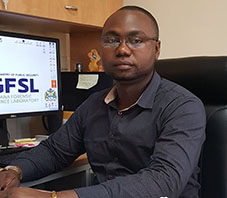The Guyana Forensic Science Laboratory (GFSL) has spent a substantial amount of time training police investigators in various aspects of evidence collection and submission and this has resulted in a significant improvement in the quality of samples sent for testing, the facility’s Director Delon France says.
In an interview last week, France revealed to Stabroek News that more than 400 ranks received training between 2013 and March 2017 and magistrates will soon benefit from a similar experience.
“We have seen an improvement in the quality of samples brought”, he said, adding that ranks are now knowledgeable about evidence collection, handling, transport and submission and more are slated to be exposed to such training.
France said that aside from the police ranks, personnel from the Chambers of the Director of Public Prosecutions (DPP) and Customs Anti-Narcotic Unit (CANU) ranks also benefited from training sessions organized by the lab.
According to France, a training programme for magistrates is being finalized. The training, he said could be held sometime in April, as the Chancellor has signalled the magistrates’ availability during this month. “We want to train them about our operations, give them some insight about the analysis that we do for them to gain some understanding so that when it is being explained in court they have an idea of what is being spoken about and some of our administrative functions such as chain of custody”, he said.
France said that since the official collection of samples started last March, the lab has been able to deal with a backlog and is currently dealing with samples “as they come in”. The only problem, right now is with the gunpowder residue cases, as the machine used for completing the testing of such samples is not in working order.
France explained that while the lab had developed methods to do the preliminary tests for gunpowder residue, the instrument needed to do the confirmatory test was not available. He said that the police lab had such an instrument but after having it transferred through the appropriate channels, it was realized that it was not in working order. Engineers, he said were brought in from abroad to look at it and efforts are now being made to get the parts needed to get it back into operation.
Given what has happened in this case, France informed that the lab is focusing on preventative maintenance which will ensure that machines are serviced regularly.
“Preventative maintenance would ensure that (the machines are) continuously working and that is one of the systems we have set up for most of our equipment. One of the challenges we are having with the equipment is that locally we don’t have persons trained to look at it so most of the time we have to bring persons from overseas which is a lot of money”, he said while noting that during his 15-year lab experience local technicians have always been difficult to source.
France during the interview dispelled concerns that the lab was stalling the testing process.
“We cannot stall the process when we don’t know whose case is it”, he said, noting that based on the packaging of the sample, his staff has no knowledge about the case.
“That is one of the reasons we have the training with police officers”, he said.France explained whenever a police officer is submitting evidence there is no name listed on the lab’s submission form but rather a code. “That is what comes here. Whenever evidence is submitted the package is labelled with a marking, police would put a marking of their choice…even the part with the case description, it don’t give any details. It would just say a defendant found with two packets of suspected marijuana in his left pocket. That’s it I don’t know anything else”, he stressed.
Additionally, he informed that once the sample is received, the lab assigns its own case number. “Once you type in the evidence into the system and then click print…the computer will assign a number …a receipt is printed out. We give that receipt to the officer so if he don’t come back with that receipt he cannot uplift it (the results). He has to come back with our receipt…if he don’t come back with that if he wants to uplift the evidence he has to get something from Crime Chief….”, France told this newspaper.
While noting that the lab’s output is at a satisfactory level and testing is moving at a reasonable pace, “we can look for ways to be better”.
He noted too that the lab is looking at ways to bring in an income as running such a facility is costly. In this regard, the lab is to look at business ventures.
“Guyana is the only country in the region that offers forensic video analysis so this is one of the areas that we plan to tap into because we are the only ones with that”, he said.
Additionally, as part of the agreement with the University of Guyana (UG) for getting the land that the lab sits on, France said that two students were assisted with their final year research project. A lab has been set up specifically for UG students and there has already been engagement with the university with regards to representatives from each facility that will need to do lab work and two administrative staff. Representatives from the lab and the Public Security Ministry who will also be involved in this arrangement have been identified.
Anyone desirous about learning more about the lab can visit the website www.gfsl.gov.gy






